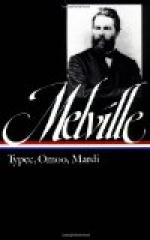BABBALANGA—Your Highness, Lombardo never presumed to criticise true critics; who are more rare than true poets. A great critic is a sultan among satraps; but pretenders are thick as ants, striving to scale a palm, after its aerial sweetness. And they fight among themselves. Essaying to pluck eagles, they themselves are geese, stuck full of quills, of which they rob each other.
ABRAZZA (to Media.)—Oro help the victim that falls in Babbalanja’s hands!
MEDIA.—Ay, my lord; at times, his every finger is a dagger: every thought a falling tower that whelms! But resume, philosopher—what of Lombardo now?
BABBALANJA—“For this thing,” said he, “I have agonized over it enough.—I can wait no more. It has faults—all mine;—its merits all its own;—but I can toil no longer. The beings knit to me implore; my heart is full; my brain is sick. Let it go—let it go—and Oro with it. Somewhere Mardi has a mighty heart—–that struck, all the isles shall resound!”
ABRAZZA—Poor devil! he took the world too hard.
MEDIA.-As most of these mortals do, my lord. That’s the load, self-imposed, under which Babbalanja reels. But now, philosopher, ere Mardi saw it, what thought Lombardo of his work, looking at it objectively, as a thing out of him, I mean.
ABRAZZA—No doubt, he hugged it.
BABBALANJA—Hard to answer. Sometimes, when by himself, he thought hugely of it, as my lord Abrazza says; but when abroad, among men, he almost despised it; but when he bethought him of those parts, written with full eyes, half blinded; temples throbbing; and pain at the heart—
ABRAZZA—Pooh! pooh!
BABBALANJA—He would say to himself, “Sure, it can not be in vain!” Yet again, when he bethought him of the hurry and bustle of Mardi, dejection stole over him. “Who will heed it,” thought he; “what care these fops and brawlers for me? But am I not myself an egregious coxcomb? Who will read me? Say one thousand pages—twenty-five lines each—every line ten words—every word ten letters. That’s two million five hundred thousand a’s, and i’s, and o’s to read! How many are superfluous? Am I not mad to saddle Mardi with such a task? Of all men, am I the wisest, to stand upon a pedestal, and teach the mob? Ah, my own Kortanza! child of many prayers!—in whose earnest eyes, so fathomless, I see my own; and recall all past delights and silent agonies-thou may’st prove, as the child of some fond dotard:— beauteous to me; hideous to Mardi! And methinks, that while so much slaving merits that thou should’st not die; it has not been intense, prolonged enough, for the high meed of immortality. Yet, things immortal have been written; and by men as me;—men, who slept and waked; and ate; and talked with tongues like mine. Ah, Oro! how may we know or not, we are what we would be? Hath genius any stamp and imprint, obvious to possessors? Has it eyes to




